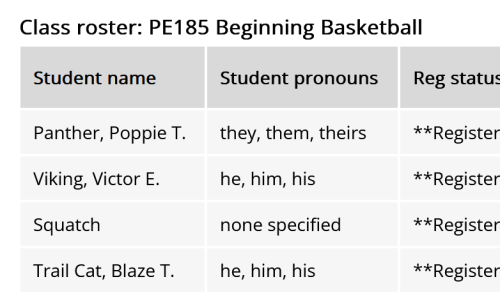Pronouns at PCC

Instructors will see pronouns in class rosters
At PCC, you have the right to specify the pronouns that you would like to be used for you. We want everyone to be treated with dignity and respect, and that includes using the correct pronouns for each other.
How to add pronouns
You can set your pronouns in the admissions application or by using the Update my pronouns form. Providing your pronouns is completely optional.
Where pronouns are shown
The pronouns you provide will be shown in the following places:
- Class rosters and grading tools used by faculty
- My Profile in MyPCC
- Other applications and systems used by PCC employees
At this time, pronouns are not automatically displayed in D2L Brightspace or Zoom. However, you can still update pronouns in both platforms:
What pronouns are available?
Updating your name
If you also want to update your first name, see preferred names at PCC.
Get help or report problems
We have a lot of interconnected systems and sometimes changes can fail to update to all platforms. If your pronouns are not showing correctly, let us try to fix it. Contact names-pronouns@pcc.edu and we’ll do some research to find out if it can be fixed.
What are pronouns and why are they important?
Providing students the opportunity to indicate their pronouns is part of fostering a respectful and inclusive college community.
Pronouns are words we use to talk about someone when we’re not using their name. Examples of pronouns include she/her, he/him, and they/them. In English, some pronouns are typically associated with specific genders. We can’t know someone’s pronouns (or gender identity) just by looking at them, so it’s important to let people tell us what pronouns we should use for them instead of making assumptions. Using the incorrect pronoun for someone is called “misgendering” and can make people feel hurt, invalidated, disrespected, and like they don’t belong. We can avoid this by asking people what pronouns we should use for them and then following through on using those pronouns. We can also lead by example and offer our pronouns (but only if we’re comfortable sharing that information). When we share our pronouns, it disrupts patterns of assumption and helps encourage others to share. PCC can also make this easier on students by listing their pronouns in places like class rosters.
Why don’t we use “preferred pronouns”?
The word “preferred” suggests that a person’s pronouns are merely a preference. Pronouns are related to important aspects of our identity and identity expression, and should always be respected. Because our identities can change over time, and we all have the right to decide when or if we share our identities with other people, our pronouns can change as well. Even if a person’s pronouns change, they are never just a preference.
